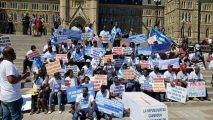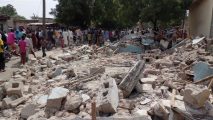Categories
Recent Posts
- Yaoundé: Defense Ministry says “Clear Alliance” between Boko Haram and criminals in recent attack
- Football: MTN Elite One resumes after boycott threats
- Biya’s election season stirs renewed anxiety in Southern Cameroons
- Revealed: Boko Haram fighters kill 20 Cameroonian troops
- Niger: military leader Tiani sworn in as president for five-year transition period
Archives
- March 2025
- February 2025
- January 2025
- December 2024
- November 2024
- October 2024
- September 2024
- August 2024
- July 2024
- June 2024
- May 2024
- April 2024
- March 2024
- February 2024
- January 2024
- December 2023
- November 2023
- October 2023
- September 2023
- August 2023
- July 2023
- June 2023
- May 2023
- April 2023
- March 2023
- February 2023
- January 2023
- December 2022
- November 2022
- October 2022
- September 2022
- August 2022
- July 2022
- June 2022
- May 2022
- April 2022
- March 2022
- February 2022
- January 2022
- December 2021
- November 2021
- October 2021
- September 2021
- August 2021
- July 2021
- June 2021
- May 2021
- April 2021
- March 2021
- February 2021
- January 2021
- December 2020
- November 2020
- October 2020
- September 2020
- August 2020
- July 2020
- June 2020
- May 2020
- April 2020
- March 2020
- February 2020
- January 2020
- December 2019
- November 2019
- October 2019
- September 2019
- August 2019
- July 2019
- June 2019
- May 2019
- April 2019
- March 2019
- February 2019
- January 2019
- December 2018
- November 2018
- October 2018
- September 2018
- August 2018
- July 2018
- June 2018
- May 2018
- April 2018
- March 2018
- February 2018
- January 2018
- December 2017
- November 2017
- October 2017
- September 2017
- August 2017
- July 2017
- June 2017
- May 2017
- April 2017
- March 2017
- February 2017
- January 2017
- December 2016
- November 2016
- October 2016
- September 2016
- August 2016
- July 2016
- June 2016
Featured
Most Commented Posts
 4 Anglophone detainees killed in Yaounde
4 Anglophone detainees killed in Yaounde
18 comments Chantal Biya says she will return to Cameroon if General Ivo Yenwo, Martin Belinga Eboutou and Ferdinand Ngoh Ngoh are sacked
Chantal Biya says she will return to Cameroon if General Ivo Yenwo, Martin Belinga Eboutou and Ferdinand Ngoh Ngoh are sacked
13 comments The Anglophone Problem – When Facts don’t Lie
The Anglophone Problem – When Facts don’t Lie
12 comments Anglophone Nationalism: Barrister Eyambe says “hidden plans are at work”
Anglophone Nationalism: Barrister Eyambe says “hidden plans are at work”
12 comments Largest wave of arrest by BIR in Bamenda
Largest wave of arrest by BIR in Bamenda
10 comments
Latest Tweets
Featured
-

Yaoundé: Defense Ministry says “Clear Alliance” between Boko Haram and criminals in recent attack
-

Football: MTN Elite One resumes after boycott threats
-

Biya’s election season stirs renewed anxiety in Southern Cameroons
-

Revealed: Boko Haram fighters kill 20 Cameroonian troops
-

Niger: military leader Tiani sworn in as president for five-year transition period
-

Over 10 Cameroon gov’t soldiers killed, 20 injured in Boko Haram attack
-

1982-2025: How long will Biya hang on?
© Cameroon Concord News 2025





29, February 2020
Guinea delays controversial referendum 0
Guinea’s President Alpha Conde announced a “slight postponement” of Sunday’s referendum on whether to adopt a new constitution, following mounting international criticism over the poll’s fairness.
The government argues that the draft constitution would, among other things, codify gender equality and ban female circumcision and underage marriage in the West African state.
But the proposal has sparked huge protests since October over fears that the real motive is to reset presidential term limits — allowing Conde, 81, to run for a third spell in office later this year.
Speaking on national television, the president said on Friday it was “due to our national and regional responsibilities that we have accepted a slight postponement of the date of the elections”.
“This is not a capitulation or a step backwards,” he said, adding that “the people of Guinea will express their choice freely at the referendum”.
While Conde did not publicly announce a date for the new vote, a letter from the leader to the West African bloc ECOWAS, seen by AFP, said the new poll should take place within two weeks.
The poll had been scheduled for Sunday alongside parliamentary elections — also delayed in the poor but mineral-rich country of some 13 million people, which has a legacy of autocratic rule.
The long-running demonstrations over the constitution issue have sometimes turned violent, with at least 30 protesters and one gendarme killed to date.
Conde’s announcement followed criticism of the electoral process from the African Union, European Union and The International Organisation of La Francophonie (OIF), which gathers French-speaking states.
The OIF said this week it had problems with around 2.5 million of the 7.7 million names on the electoral roll, pointing to duplicate registrations and people who had died.
The African Union also cancelled an electoral observation mission to Guinea on Friday, citing a “major controversy” with the roll.
Meanwhile the EU said in a statement that a “lack of inclusiveness and transparency casts doubt on the credibility of the upcoming elections”.
Quiet streets
Sekou Conde, a cadre in the president’s Rally of the Guinean People (RPG) party, said the vote had been postponed purely for technical reasons.
“It has nothing to do with the electoral roll,” he said, adding that people had ransacked voting stations.
A Western diplomat, who declined to be named, said he thought the delay would make no difference anyway.
“This changes nothing,” he said, adding that there would be no credible change to the problems with the electoral roll within two weeks.
The streets of the capital Conakry were quiet on Friday evening after the announcement, despite months of protests.
Ibrahima Diallo, the operations manager for the National Front for the Defence of the Constitution — an alliance of opposition groups behind the protests — said that demonstrations would continue until Conde shelved the referendum.
Although both the current constitution and the proposed new text limit presidential terms to two, critics fear that passing a new constitution would reset presidential term limits to zero.
This would potentially allow Conde to run again when his second term runs out at the end of the year.
Conde was a longtime opposition figure who became the nation’s first democratically elected president in 2010 on promises to fight corruption. He was re-elected in 2015.
Source: AFP